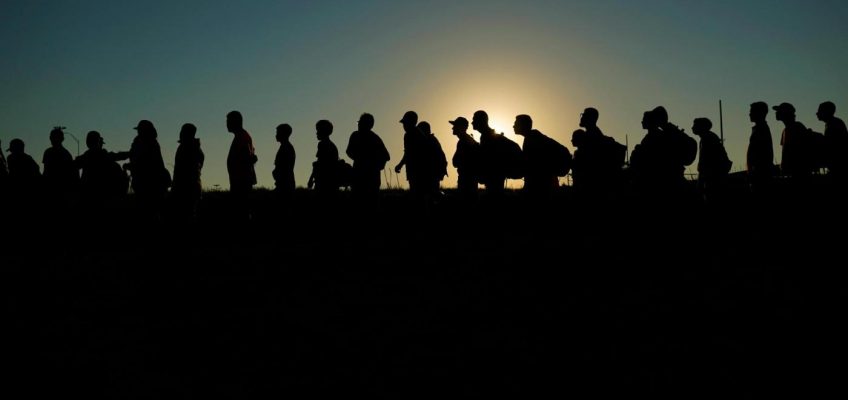McALLEN, Texas — The U.S. Supreme Court will allow Texas to start arresting migrants who cross the U.S.-Mexico border and ordering them to leave, while the legal battle over Republican Gov. Greg Abbott’s latest immigration move plays out.
The court issued a divided decision Tuesday that allows Texas to enforce its immigration law for now. The high court declined to intervene on an administrative stay placed by the 5th Circuit Court of Appeals.
The Justice Department is challenging the law, saying Texas is overstepping the federal government’s immigration authority. Texas argues it has a right to take action over what Abbott has described as an “invasion” of migrants on the border.
The 5th Circuit is set to hear arguments in April. A federal judge in Texas issued a sweeping rejection of the law last month, calling it a violation of the Supremacy Clause of the U.S. Constitution.
Here’s what to know:
Who can be arrested?
The law allows any Texas law enforcement officer to arrest people suspected of entering the country illegally. Once in custody, migrants could either agree to a Texas judge’s order to leave the U.S. or be prosecuted on misdemeanor charges of illegal entry. Migrants who don’t leave could face arrest again under more serious felony charges.
Arresting officers must have probable cause, which could include witnessing the illegal entry or seeing it on video.
The law cannot be enforced against people lawfully present in the U.S., including those who were granted asylum or who are enrolled in the Deferred Action for Childhood Arrivals program.
Critics, including Mexico President Andrés Manuel López Obrador, fear the law could lead to racial profiling and family separation. American Civil Liberties Union affiliates in Texas and some neighboring states issued a travel advisory a day after Abbott signed the law. The advisory warns of a possible threat to civil and constitutional rights when passing through Texas.
Abbott has rejected concerns over profiling. While signing the bill, he said troopers and National Guard members at the border can see migrants crossing illegally “with their own eyes.”
Where will the law be enforced?
The law can be enforced in any of Texas’ 254 counties, including those hundreds of miles from the border.
But Republican state Rep. David Spiller, the law’s author, has said he expects the vast majority of arrests will occur within 50 miles of the U.S.-Mexico border. Texas’ state police chief has expressed similar expectations.
Some places are off-limits. Arrests cannot be made in public and private schools; places of worship; or hospitals and other health care facilities, including those where sexual assault forensic examinations are conducted.
It is unclear where migrants ordered to leave might go. The law says they are to be sent to ports of entry along the U.S.-Mexico border, even if they are not Mexican citizens. However, Mexico’s government said Tuesday it would not accept the return of any migrants to its territory from the state of Texas.
Is the law constitutional?
The Supreme Court’s decision did not address the constitutionality of the law.
The Justice Department, legal experts and immigrant rights groups have said it is a clear conflict with the U.S. government’s authority to regulate immigration.
U.S. District Judge David Ezra, an appointee of former President Ronald Reagan, agreed in a 114-page order. He added that the law could hamper U.S. foreign relations and treaty obligations.
Opponents have called the measure the most dramatic attempt by a state to police immigration since a 2010 Arizona law — denounced by critics as the “Show Me Your Papers” bill — that was largely struck down by the U.S. Supreme Court. Ezra cited the Supreme Court’s 2012 Arizona ruling in his decision.
Texas has argued that the law mirrors federal law instead of conflicting with it.
What is happening on the border?
Arrests for illegal crossings along the southern border fell by half in January from record highs in December. Border Patrol officials attributed the shift to seasonal declines and heightened enforcement by the U.S. and its allies. The federal government has not yet released numbers for February.
Texas has charged thousands of migrants with trespassing on private property under a more limited operation that began in 2021.
Tensions remain between Texas and the Biden administration. In the border city of Eagle Pass, Texas, National Guard members have prevented Border Patrol agents from accessing a riverfront park.
Other Republican governors have expressed support for Abbott, who has said the federal government is not doing enough to enforce immigration laws. Other measures implemented by Texas include a floating barrier in the Rio Grande and razor wire along the border.
___
Associated Press writers Acacia Coronado and Paul Weber in Austin, Texas, contributed to this report.
Related Articles
Trump asks Supreme Court to dismiss case charging him with plotting to overturn 2020 election
Eight House races to watch in Tuesday’s primaries
Trump is making the Jan. 6 attack a cornerstone of his bid for the White House
Trump says Jews who vote for Democrats ‘hate Israel’ and their religion
Biden and Trump notch more wins Tuesday as primary voters urge them to keep up the fight


Leave a Reply